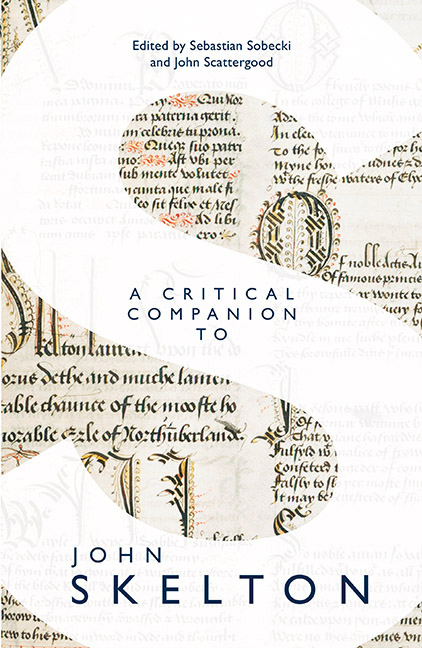Book contents
- Frontmatter
- Dedication
- Contents
- Acknowledgements
- Contributors
- Abbreviations
- Conventions
- Introduction
- 1 John Skelton (?1460–1529): A Life in Writing
- 2 Religion
- 3 Law and Politics
- 4 Classical Literature
- 5 Humanism
- 6 Satires and Invectives
- 7 Lyrics and Short Poems
- 8 Skelton's Voice and Performance
- 9 Literary Tradition
- 10 Skelton and the English Language
- 11 Skelton's English Works in Manuscripts and Print
- 12 Skelton's English Canon
- 13 Reception and Afterlife
- A Skelton Bibliography
- Index of Manuscripts
- Index of Printers and Stationers
- General Index
12 - Skelton's English Canon
Published online by Cambridge University Press: 24 July 2019
- Frontmatter
- Dedication
- Contents
- Acknowledgements
- Contributors
- Abbreviations
- Conventions
- Introduction
- 1 John Skelton (?1460–1529): A Life in Writing
- 2 Religion
- 3 Law and Politics
- 4 Classical Literature
- 5 Humanism
- 6 Satires and Invectives
- 7 Lyrics and Short Poems
- 8 Skelton's Voice and Performance
- 9 Literary Tradition
- 10 Skelton and the English Language
- 11 Skelton's English Works in Manuscripts and Print
- 12 Skelton's English Canon
- 13 Reception and Afterlife
- A Skelton Bibliography
- Index of Manuscripts
- Index of Printers and Stationers
- General Index
Summary
The canon of John Skelton's English poems as established by modern scholarship depends on assessment of a range of evidence with different degrees of authority. What follows is an overview of that evidence, both contemporary and posthumous, and an appraisal of its relative weight.
One can begin with those ascriptions of poems to Skelton in forms, both print and manuscript, that certainly or very probably survive from the period before his death in 1529. There are eight printed editions during his lifetime of poems of which Skelton has been held to be author, by four different publishers. In their likely chronological order these are: the bouge of courte [1499] (STC 22597) and again [c. 1510] (STC 22598); [Elynour Rummynge] [1521?] (STC 22611.5), all printed by Wynkyn de Worde; A ballade of the scottisshe kynge [1513] (STC 22593) and a goodly garland or chapelet of laurel (1523) (STC 22610), both printed by Richard Faques; A replycacion against certayne yong scolars [1528] (STC 22609), printed by Richard Pynson; agaynste a comely coystrowne [1527?] (STC 22611) and dyuers balettys and dyties solacyous [1528?] (STC 22604), both printed by John Rastell. Four of these editions name him as author: the garland of laurel; agaynste a comely coystrowne; A replycacion against certayne yong scolars; and dyuers balettys and dyties solacyous. All these are from the later stages of his career, when his identity as poet was firmly established, though the poems that some of them contain may have been composed and circulated much earlier than the surviving witnesses.
The situation in contemporary manuscripts is a little different. Four manuscripts that contain five of his poems name Skelton as author and can be certainly or very probably be dated before his death. The very early Upon the Dolorus Dethe … of the Mooste Honorable Erle of Northumberlande, in British Library, MS Royal 18 Dii, fols 165–6v, was composed c. 1489 (it only survives in a copy from the late 1520s). A Lawde and Prayse Made for Our Sovereigne Lord the Kyng, probably composed to celebrate the accession of Henry VIII in 1509, survives in what may be Skelton's holograph, in London, TNA, Records of the Treasury of the Receipt of the Exchequer MS E. 36–228, fols 7–8.
- Type
- Chapter
- Information
- A Critical Companion to John Skelton , pp. 180 - 193Publisher: Boydell & BrewerPrint publication year: 2018



